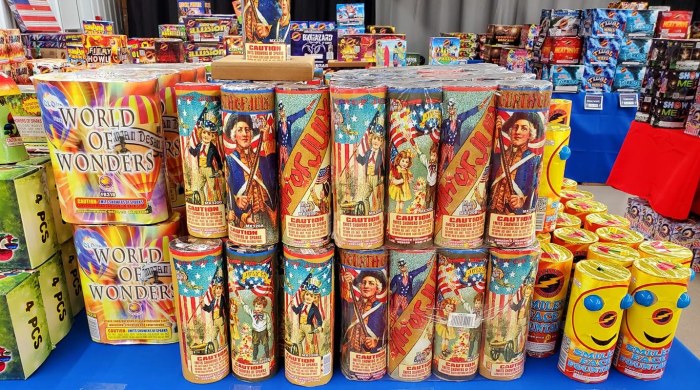Tyler Granger: Amateur fireworks displays cause many problems, from airborne toxins to worsening respiratory illnesses like COVID-19. -promoted by Laura Belin
A new annual tradition is taking shape for Des Moines metro residents after the Fourth of July. For the last three years, air quality alerts have been issued due to excessive use of amateur fireworks.
Iowa legalized the sale and purchase of fireworks in 2017. Since then, pet owners across the state–especially owners of hunting dogs–have frequently been upset this time of year. Hunting dogs that are trained to work with gunshots will display anxiety over fireworks will show signs of distress as the Fourth of July approaches.
There are tips and tricks for helping pets deal with the anxiety caused by explosions, along with resources for people dealing with the same stress (such as veterans with post-traumatic stress disorder). Even with the best techniques to mitigate a heightened sense of terror, we all endure the noise pollution brought on by America’s Independence Day.
Noise pollution is not the only reason why some cities want to ban fireworks. Public health officials warn of the risk of airborne toxins. Fireworks can endanger migratory birds and create litter across all our communities. Some states have banned fireworks due to wildfire concerns.
In light of all those who may suffer due to poor air quality, one wonders why fireworks would be a priority during uncontrolled spread of a respiratory illness.
Although multiple cities canceled their July 4 fireworks displays due to social distancing concerns, there were still several cases of reduced air quality across central Iowa. Pollution advisories are harmful to those who are recovering from the coronavirus. We need to start seeing air pollution as an accomplice to COVID-19. Those who have contracted the virus and live in a relatively polluted community will tend to suffer more because the air quality prolongs recovery times.
Like climate change, cigarettes, and the coronavirus, fireworks are a global problem. Fireworks are enjoyed around the world and it takes globalization to meet the demand. The mining for sulfur and distilling of toxic chemicals needed for the color displays creates an immense carbon footprint even before the fireworks are lit. Wildlife is destroyed through the strip mining which excavates the raw materials needed to create the displays. Forests are cut down to clear way for the mining of the materials.
Most of the global community overlooks the ecological damage caused by fireworks consumption. Fire is one of many facets of our disposable consumer culture, which clashes with demands to change behavior to adapt to climate change and COVID-19. After a fireworks display, toxic waste particles will fall into our soil and waterways.
While we may feel hopeless in the face of pollution, we need to lift up all the scientists who are communicating urgency to fight global threats. Demanding climate action from Senators Joni Ernst and Chuck Grassley is a good first step. Another way to support all those who are suffering from the global pandemic would be reducing air pollution by eliminating fireworks displays.
Tyler Granger is a field representative with the National Wildlife Federation.
Top photo: Image from central Iowa retailer Blazing Glory Fireworks’ Facebook page.


1 Comment
Good points
And speaking of increasingly-popular U.S. customs that cause needless environmental problems, it’s also distressing to see more and more Iowa balloon releases, the legality of which seems to be based on the idea (similar to fireworks, actually) that if you have fun or find deep personal meaning in essentially throwing crap up into the sky, it’s not really litter or pollution. Some states have had the sense to outlaw balloon releases, but Iowa, alas, is not one of them.
PrairieFan Wed 8 Jul 2:37 PM